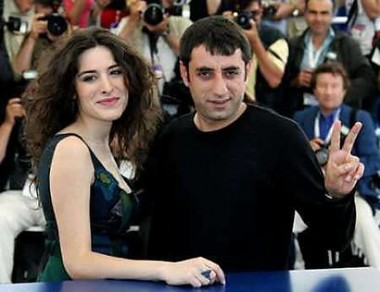Actress Belcim Bilgin and actor Nazmi Kirik pose during a photocall for Iraqi-born director Hiner Saleem's film 'Kilometre Zero' at the 58th Cannes Film Festival, May 12, 2005. Photo by Vincent Kessler/Reuters
By Duane Byrge
Bottom line: A blunt but often powerful glimpse into the horrors of Saddam Hussein's Iraq and the ethnic strife between Arabs and Kurds.
It's a road picture with a MacGuffin. Yet in this powerful, contemporary case, it's no standard generic product: The road is the dusty backways of Iraq, and the MacGuffin is a dead Iraqi soldier whom our battling, nonbuddy heroes must transport to his family. Although generically structured, "Kilometre Zero" offers a searing look into the horrors the people of Iraq, specifically the Kurds, suffered under the brutish tyranny of Saddam Hussein.
Its most hospitable U.S. venue might be 1600 Pennsylvania Ave., since this Competition entrant personalizes the freedom one Kurdish family attains as a result of the U.S. liberation of Iraq and the downfall of Hussein. Unfortunately, "Kilometre's" powerful message is delivered with often blunt aesthetics, and commercial prospects are negligible unless the Republican Party gets into the film distribution racket.
Set in 1988 amid the Iraq-Iran war, we follow a young Kurdish husband and father, Ako (Nazmi Kirik), as he is conscripted into the Iraqi Army and thrust into the front lines. Army life is brutal and hellish, and the real enemies, it seems, are his sadistic superior officers. With awful equipment, no training and boneheaded strategy, the "grand army" bungles along on its belly, generally entrenched under enemy bombardment. However, the god of the military bureaucracy shines on Ako when he is assigned to accompany a fellow soldier's corpse to his family and temporarily leave the mayhem. With a flag-wrapped coffin atop an orange GMC vehicle, Ako and an Iraqi cab driver (Robert Alazraki) set out on their mission.
Ako and the driver exchange hostile words: The hatred between the Arab and the Kurd is emblematic of the ethnic strife in that tyrannized land. Unfortunately, writer-director Hiner Saleem's filmmaking skills are not always sufficient for his theme and story. The dialogue is often expositional and the visuals somewhat crude. The epiphany these men finally reach is muddled by Saleem's uneven storytelling. Eventually, it jumps forward to the present and a maudlin last shot of Ako and his family gazing at the Eiffel Tower, representing freedom -- a bit cheeky, one might add, given France's opposition to the conflict in Iraq.
In certain instances, the film resembles a rough cut, but there is a diamond of a story beneath its modest budget constraints. A cortege of coffin-bearing cabs as they wind across the horizon is a searing correlative for the sad horrors of life in Iraq. A sobering, running gag is a towering statue of Saddam Hussein on a flatbed truck that seems to shadow our travelers' transport. There is also some contrapuntal comedic hilarity as the bombastic military music of the Iraqi Army blasts from the cab radio.
Under Saleem's hand, the technical contributions are frequently eloquent, specifically composer Nikos Kipourgos' baleful score, amplified with the wails of a sad people's plea.
KILOMETRE ZERO
Memento Films Distribution
Memento Films Production/La Cinefacture, Hiner Saleem Prods.
Credits:
Screenwriter-director: Hiner Saleem
Director of photography: Robert Alazraki
Production designer: Kamal Hamarash
Music: Nikos Kipourgos
Editor: Anna Ruiz
Sound: Freddy Loth
Cast:
Ako: Nazmi Kirik
Salma: Belcim Bigin
Taxi driver: Robert Alazraki
No MPAA rating
Running time -- 91 minutes






No comments:
Post a Comment